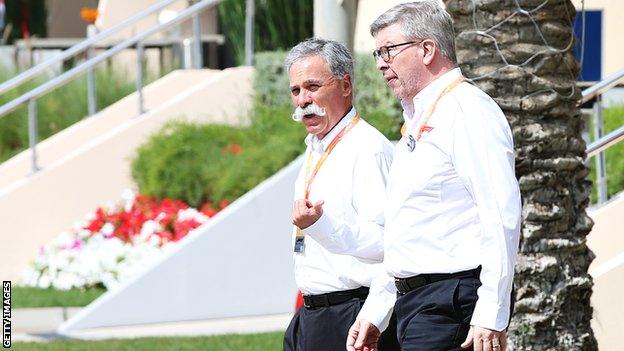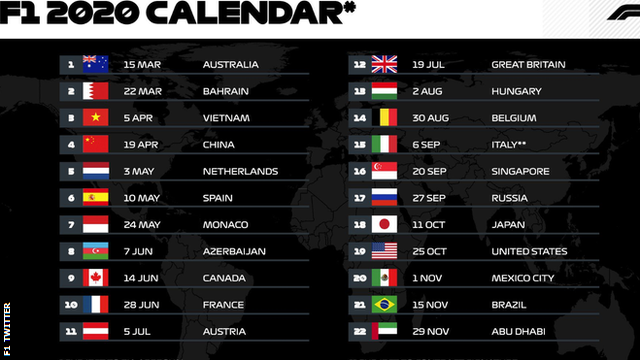Formula 1 bosses Chase Carey and Ross Brawn commit to staying in roles
- Published
- comments

Carey and Brawn pictured together in the Paddock before the Bahrain Grand Prix in March
Formula 1 bosses Chase Carey and Ross Brawn have committed to staying in their roles to complete the process of overhauling the sport.
F1 is in the middle of discussions over new rules from 2021, including a revamp of the cars and introduction of a budget cap.
Chief executive Carey and managing director motor sports Brawn will stay on at least until the new structure is completed and stabilised, BBC Sport can reveal.
But commercial boss Sean Bratches is tipped to leave F1 at the end of this year.
The commercial structure of the sport will be revamped over the winter and senior sources say that Bratches, the managing director commercial operations, will not stay in his post.
Bratches, a former vice-president of sales and marketing at US television network ESPN, joined F1 with Carey and Brawn when the sport was take over by US group Liberty Media at the start of 2017.
F1 declined to comment on the contractual position of its three senior managers.
The commitment by Carey and Brawn means both are set to stay in post at a minimum through the first part of 2021, to ensure not only that the rules process is completed but that any teething problems that emerge that season will be dealt with by experienced hands rather than newcomers.
It is understood that both Carey and Brawn are determined to finish what they started, have strong relationships with Liberty bosses and are minded to stay as long as is needed.
The move gives the sport stability and may act as a reassurance to shareholders and investors at an uncertain time.
Other than Renault, the teams' contracts do not run beyond the end of next season and talks over the 2021 rules are at a delicate stage.
Brawn and his technical team have been working on a major revamp of the rules that is aimed at closing up the field and making the cars able to race much more closely together.
There are also plans to introduce a series of standard parts which it is hoped, when combined with a budget cap of $175m a year for car operations, will close up the field.

F1 will introduce 22 races to the calendar for the 2020 season
However, the top three teams Mercedes, Ferrari and Red Bull are opposing such sweeping changes.
They feel that introducing so many changes at once could backfire and would prefer to keep the technical rules pretty much unchanged. They are also opposed to many of the standard parts as they feel using them will reduce quality, increase the cars' weight and not significantly reduce costs.
Their argument is that the budget cap is already agreed and that its introduction renders the need for standard parts obsolete.
This has caused a stand-off between Mercedes, Ferrari and Red Bull on one hand and F1, governing body the FIA and the other teams on the other.
There are even suggestions that Ferrari could use its power of veto over the 2021 technical changes if a compromise that they find agreeable cannot be reached.
There is a deadline of 31 October to finalise new sporting and technical rules for 2021, after which a new revenue distribution and governance procedure needs to be agreed.
At the same time, F1's bosses are discussing potential changes to the format of grand prix weekends next year in an attempt to keep the sport relevant to younger audiences.
One idea being broached is at a select number of races next year to replace qualifying with a race, with grid positions set in reverse championship order and the finishing positions defining the grid for the grand prix on Sunday.
This and other proposals will be discussed at the next major meeting of teams and bosses in Geneva next month.